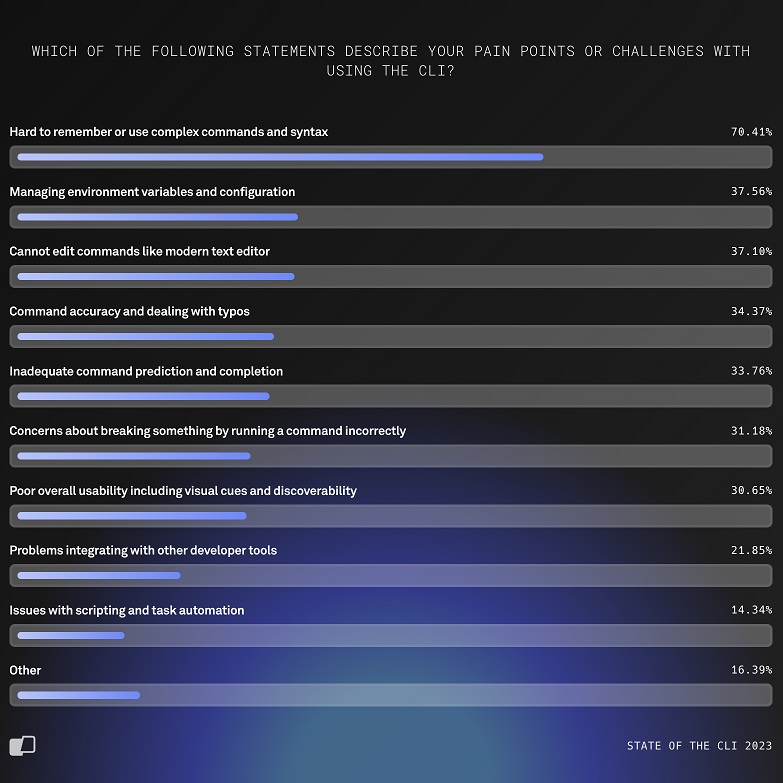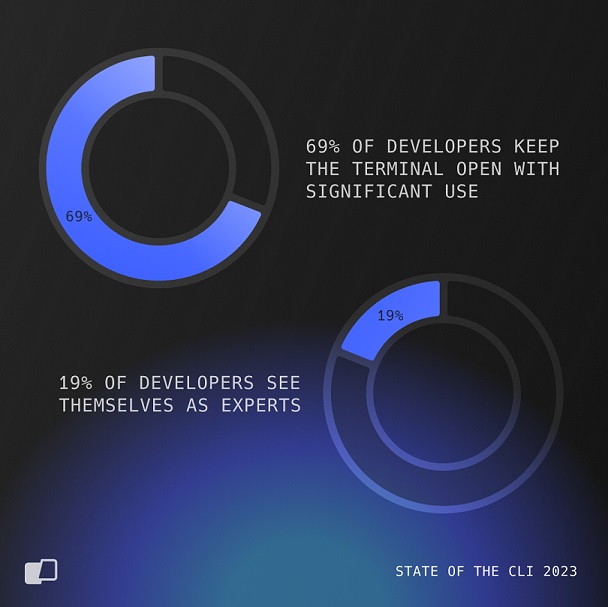Check Point® Software Technologies Ltd.(link is external) announced that its Infinity Platform has been named the top-ranked AI-powered cyber security platform in the 2025 Miercom Assessment.
A few months ago, Warp surveyed 1500+ developers about how they use the command line terminal. Specifically, the survey asked questions around common pain points, popular plugins, use of artificial intelligence, types of customizations, and perceived expertise in industry-level developers. What's the story behind the complex relationship between coder and terminal? Here is what the survey revealed.
General Terminal Usage Patterns
What do developers mainly use the terminal for? The data shows that it's essential for common tasks like compiling and running code and version control. Less frequently, respondents turn to the CLI for system monitoring and production debugging.

Click on the image for a larger version
What is the biggest pain point developers have in the terminal? An overwhelming majority (70%) say that remembering complex terminal commands is the major challenge.

Click on the image for a larger version
Emergence of AI in the terminal
There's no buzzier technology right now than AI, so how has that penetrated into the command line experience? Surprisingly (or maybe not?) 40% of respondents indicated they do not use any AI tools in the terminal. 10% express no intention to ever integrate with AI.

Of the developers that were interested in the application of AI, 40% believed the biggest impact it would have would be helping with command generation and suggestions. For example, generating a script to run data migration or suggesting hard-to-remember flags in a kubernetes command.

Click on the image for a larger version
Do Developers Feel Comfortable Using the Terminal?
Did you know that 70% of our respondents marked the terminal as a primary tool in their workflow (meaning that they use it daily), but only 19% consider themselves “experts”?


The terminal is foundational for many developers, but there seems to be a gap - whether in education, confidence, or tool discoverability - that impacts their self-perceived mastery.
Survey Respondent Overview
Of the respondents, over 60% are full-time software engineers at tech companies. There's a relatively even distribution between early levels (1-2 years) and senior levels (15+ years) of coding experience, with a slightly heavier skew towards those who are mid-level (3-5 years). Something important to note is ~80% of the respondents are Mac users.
Conclusion
The command-line remains an indispensable tool at the center of many developer workflows and there is now more visibility into how developers use it, what's lacking, and what the future of it might look like.
Industry News
Orca Security announced the Orca Bitbucket App, a cloud-native seamless integration for scanning Bitbucket Repositories.
The Live API for Gemini models is now in Preview, enabling developers to start building and testing more robust, scalable applications with significantly higher rate limits.
Backslash Security(link is external) announced significant adoption of the Backslash App Graph, the industry’s first dynamic digital twin for application code.
SmartBear launched API Hub for Test, a new capability within the company’s API Hub, powered by Swagger.
Akamai Technologies introduced App & API Protector Hybrid.
Veracode has been granted a United States patent for its generative artificial intelligence security tool, Veracode Fix.
Zesty announced that its automated Kubernetes optimization platform, Kompass, now includes full pod scaling capabilities, with the addition of Vertical Pod Autoscaler (VPA) alongside the existing Horizontal Pod Autoscaler (HPA).
Check Point® Software Technologies Ltd.(link is external) has emerged as a leading player in Attack Surface Management (ASM) with its acquisition of Cyberint, as highlighted in the recent GigaOm Radar report.
GitHub announced the general availability of security campaigns with Copilot Autofix to help security and developer teams rapidly reduce security debt across their entire codebase.
DX and Spotify announced a partnership to help engineering organizations achieve higher returns on investment and business impact from their Spotify Portal for Backstage implementation.
Appfire announced its launch of the Appfire Cloud Advantage Alliance.
Salt Security announced API integrations with the CrowdStrike Falcon® platform to enhance and accelerate API discovery, posture governance and threat protection.
Lucid Software has acquired airfocus, an AI-powered product management and roadmapping platform designed to help teams prioritize and build the right products faster.
StackGen has partnered with Google Cloud Platform (GCP) to bring its platform to the Google Cloud Marketplace.













